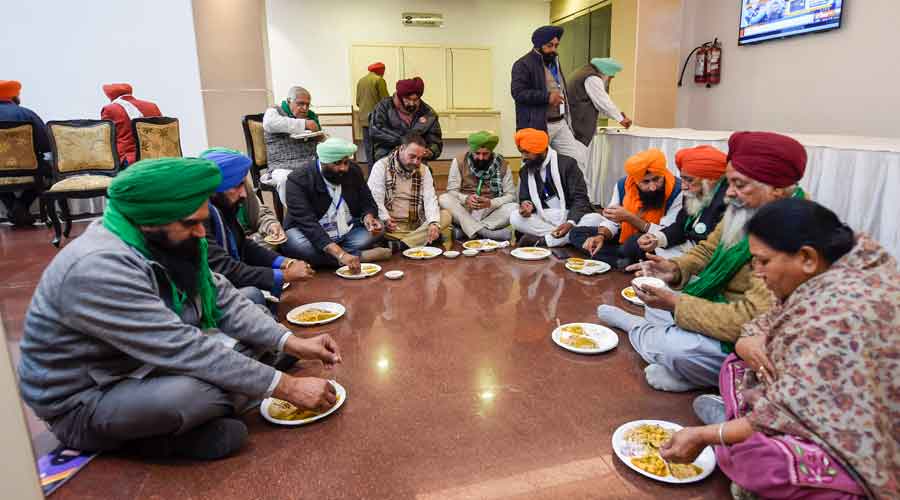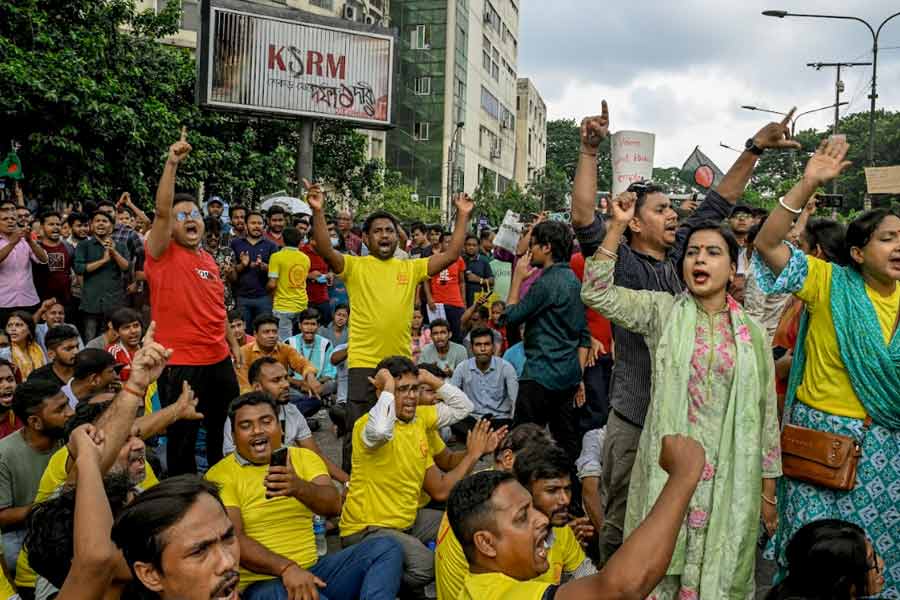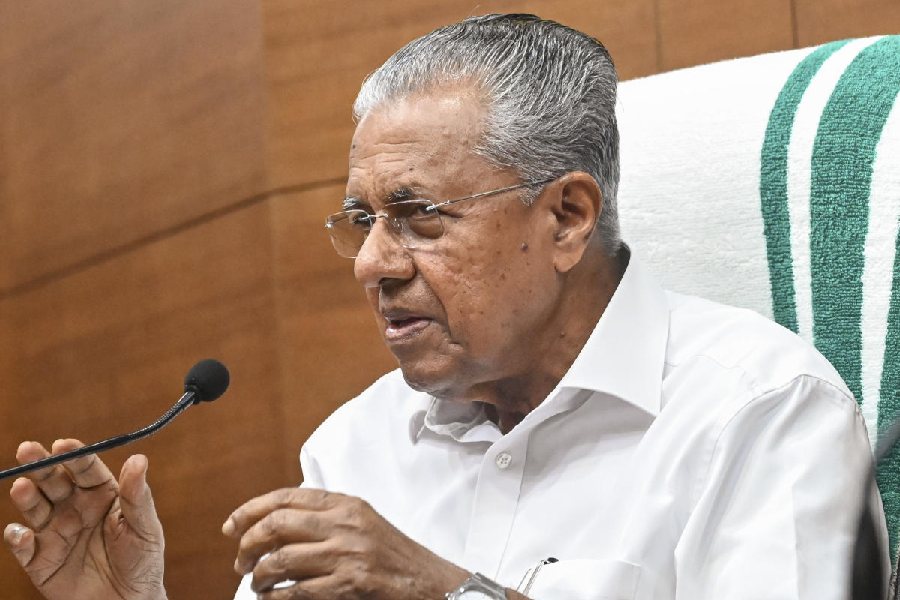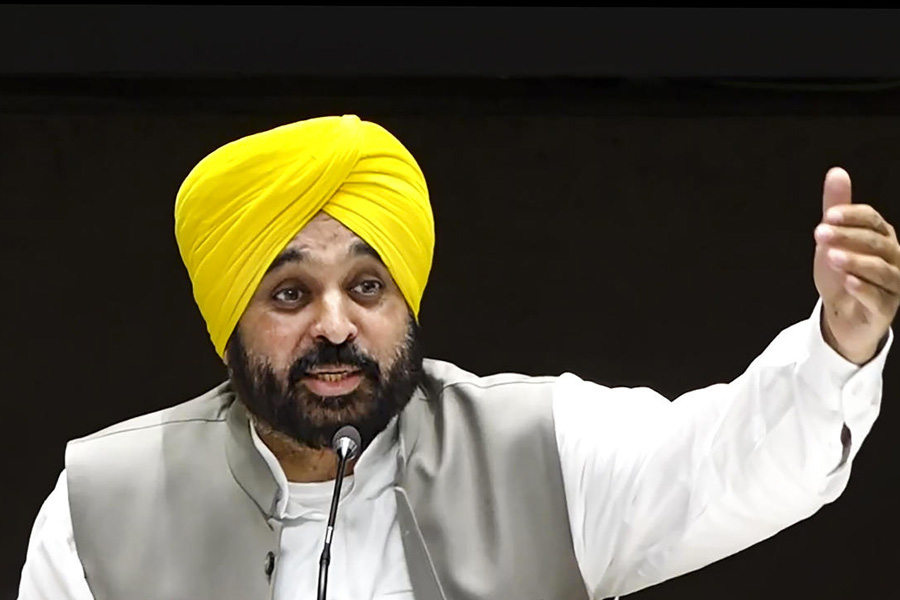Had it been any other government, the farmers would have called off their protest after receiving an assurance that the contentious farm laws would be kept in abeyance for 18 months, believes Waryam Singh.
“But not with this government,” the elderly farmer from Punjab’s Tarn Taran district stressed as he and fellow protesters sat around a fire on a chilly winter morning at the Singhu border.
“Modi sarkar pe humko vishwas nahi hai (We don’t trust the Modi government),” he declared.
It was a sentiment expressed widely across the protest epicentre on Friday —through posters, chants and effigies or just terse statements like Waryam’s; by sloganeering women marchers and contrite former Modi bhakts.
Explaining their distrust, Waryam and several others cited how the Narendra Modi government had got the three “anti-farmer” laws enacted “chupke se” (sneakily) while the people were battling Covid-19.
The laws were brought through ordinances in June when the country was in lockdown. Later, in September, the bills were rushed through Parliament by a much-contested voice vote. By then, BJP ally Akali Dal had pulled out its minister in protest against the bills and parties seen as friendly to the government had either opposed the bills or asked for them to be sent to the Select Committee in Parliament.
“This is a ploy by the government,” Waryam said, implying the government’s promise to keep the laws in abeyance was an attempt to trick the farmers into ending their protest.
“Hum yahan se hatne wale nahi hai: 2024 tak baithenge, lekin kanoon radd kiye bina ghar nahi lautenge (We won’t retreat. We’ll sit here till 2024 if necessary; we won’t return till the laws have been repealed),” said Rai Singh, a Jat farmer from Haryana. The next general election is due in 2024.
On Thursday, the protesting farmers had rejected the government’s offer to suspend the implementation of the three laws, saying the 143 farmers “martyred” while protesting had died seeking repeal and not such half-measures.
If the government had hoped the offer would mollify the farmers, it seems to have had the opposite effect. The farmers now feel the offer reflects how their agitation has forced the government into a climb-down, and that a final push would force it to repeal the laws.
“If we withdraw now, it would mean victory for the government,” said Paramjit Singh, an activist from Chhattisgarh.
The rejection of the government offer by the Samyukta Kisan Morcha, under whose banner the movement is being conducted, may have been driven by the mood at the protest sites, an office-bearer with a farm union who declined to be named suggested.
“The protesters may have refused to withdraw the agitation,” he said, adding that the unions had sensed that the mood was for a “decisive battle”.
The crowd was much larger on Friday at Singhu and appeared more determined, if that is possible. The women were especially visible with their chants against the “Modi sarkar”, “Khattar sarkar (Haryana government)”, “Adani-Ambani” and the RSS.
As the farm union office-bearer was speaking, a procession of mostly women passed by carrying an effigy of Modi. “Look, this is the level of anger against the government,” he said.
Asked why they wanted to burn an effigy of the Prime Minister, Jagdeep, a homemaker from Patiala, shot back: “Jab Pradhan Mantri humko maarna chahta hai to hum kya karen (What do we do when the Prime Minister wants to kill us)?”
“People are dying here,” she said, “and we are being given date after date (for talks).”
The farmers are furious that the government has been dragging the talks on — Friday witnessed the 11th round — while the death toll keeps rising among their ranks.
Having had her say, Jagdeep hurried off to join the others shouting “Modi murdabad (Down with Modi)”.
The loudspeakers too keep blaring attacks on Modi and the RSS, and the posters and wall paintings along the highways castigate the Prime Minister and his “corporate friends”, accusing them of planning to use the new laws to usurp the farm sector.
Has the movement against the farm laws turned into a general sense of anger at Modi and the policies of his government? An elderly Baldev Singh, from a village near Amritsar, has no doubt that it has.
“Modi jhooth bolta hai. Bola kisan ki kamaayi doguna karega aur kiya kya? Chupke se humko khatam karne ka kanoon laya (Modi tells lies. He promised to double the farmers’ income but what did he do? He brought in these laws surreptitiously to finish us),” he alleged.
Nirmal Singh and several others from the knot of farmers with whom Baldev sat recalled the “note-bandi” (demonetisation), condemned it as “tanashahi” (dictatorship) and said everybody could now see what a fiasco it was.
Rajkumar Danda, a Jat farmer from Jind, joined the conversation. He said he had been a “Modi bhakt” but not any more.
“We were fed up with the Congress and saw a lot of hope in Modi. But now my faith in him has been shattered. If these laws are implemented, the farmers will be at the mercy of Adani and Ambani,” he said.
Pagdi solidarity
Rajkumar and a friend, Baljit Singh, displayed the “pagdis” (turbans) they had worn as a mark of solidarity with their Sikh brethren from Punjab.
Rajkumar said the BJP was trying to divide Punjab and Haryana but more and more farmers, mostly Jats from Haryana, were joining the agitation. Regular supplies of milk and vegetables from Haryana are helping sustain the protest, he said.
“Jab tak ye pagdi sar par hai, hum hookah nahi peete (As long as I wear this turban, I’m not smoking),” Rajkumar said.
Jat farmers are known to love their hookah while smoking is prohibited in Sikhism.
“Ladai chalti rahegi jab tak kanoon radd nahi hote (The battle will continue till the laws are scrapped),” Rajkumar signed off.











